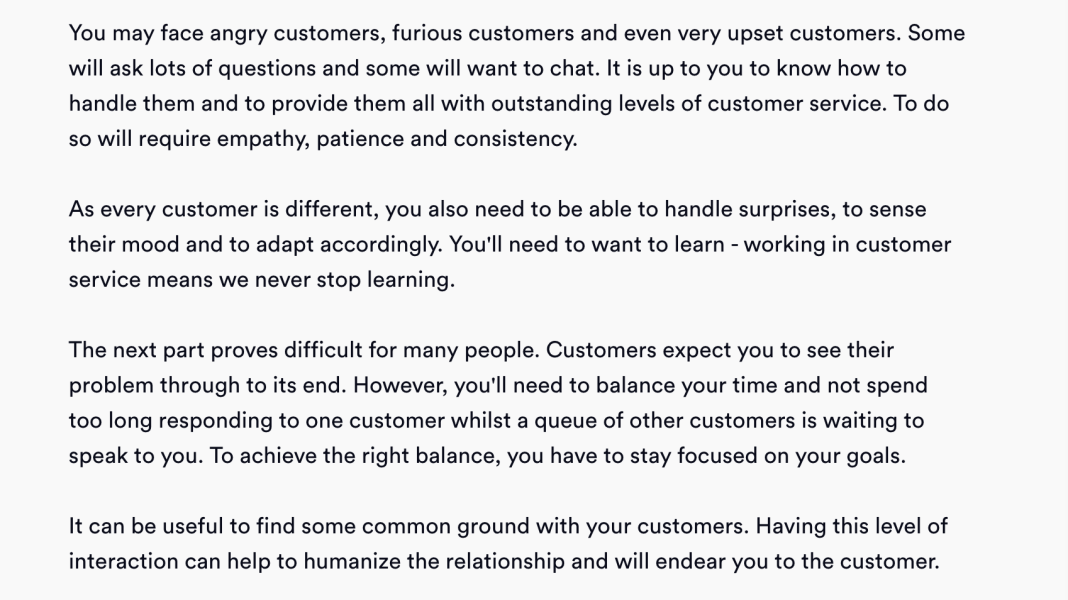What is a verbal reasoning test?
A verbal reasoning test assesses your ability to make deductions from text. The format is typically a written passage followed by a statement, and you must decide whether the statement is true, false or that you cannot say. They evaluate your understanding of language and level of verbal comprehension and logic.
Depending on the role you are applying for, questions may range from basic reading comprehension to more advanced reasoning. There are also a number of different test providers used by recruiters, offering a range of verbal reasoning assessments for different industries and job levels. We will look at these in more detail later in this article.
Why do employers use verbal reasoning tests?
Verbal reasoning tests are psychometric tests designed to reveal a candidate’s language and comprehension skills, and their ability to apply reasoning and logic.
These are key in any working environment, which is why verbal reasoning tests are so popular with employers in a wide range of industries – even those you might not think require strong verbal skills.
Many employers also regard verbal reasoning tests as more fair than other types of assessment, such as an unstructured interview. This is because all candidates face questions of a similar level of difficulty and their tests are scored objectively.
So verbal reasoning tests may help to provide a more level playing field for applicants from all backgrounds. However, a verbal reasoning test is likely only to form one part of a wider selection process, and your performance in all areas will be taken into consideration by the employer.
How do verbal reasoning tests work?
There are two main formats of verbal reasoning tests:
Verbal critical reasoning – these test your ability to apply logic by confirming whether a given statement is verified by the text provided.
Reading comprehension – these assess your ability to digest written information and then use the information provided to answer questions quickly and accurately.
The most common form is the true/false/cannot say test, where you are required to read some text and then determine whether the statement that follows is true, false or impossible to say based on the information provided.
Other forms of verbal reasoning tests you may encounter are:
Explicit multiple choice – here the answer to questions will be explicitly stated in the text. For example ‘Who said..?’ or ‘How many..?’
Implicit multiple choice – here the answer will not be explicitly stated but can be inferred from details provided in the text. For example ‘What made the employee decide to…?’; or ‘What caused…?’
Meta multiple choice – here the answer does not refer to details specifically given in the text but requires the candidate to answer broader questions such as ‘What can we conclude from…?’ or ‘Which statement would weaken the argument..?’
Regardless of the format of the test, you will need to read the text, interpret the information and decide on the most logical conclusion. It is important to remember that no previous knowledge of the passage topic is required, so make your decisions based solely on the information you’re given.
As well as or instead of verbal reasoning tests, you may also be asked to take a verbal test assessing your language and literacy skills. This could include:
Grammar and spelling – checking your knowledge of correct spelling and grammar. These might include questions such as find the new word and word swap (for more on those, check out the videos at the bottom of this article).
Vocabulary – testing the range of your vocabulary and your ability to identify correctly how ideas are related. This is usually in the form of synonyms or antonyms (words that have the same or opposite meaning to another).
Word analogy - testing your ability to find the relationship between a pair of words. Examples of word analogy questions can be found here.
How best to prepare for a verbal reasoning test
The best way to perform well in a verbal reasoning test is to make sure you are familiar with the format and have done plenty of practice before you sit the test. Practice questions will help you to identify your weaknesses and develop your own methods for success.
If you’d like to practice offline, you can download our verbal reasoning test pdf.
During your practice, make a note of your most common mistakes or the aspects you struggle most with, and then focus on improving your performance in these areas. And be sure to take the practice tests under timed conditions – speed as well as accuracy will be crucial when it comes to the real thing.
Try to find out which test provider the recruiter will be using (see next section), and the type of test you will be sitting. You should then be able to visit the provider’s website to find more information and possibly try a few example questions.
Common verbal test providers
Verbal reasoning tests vary in format and difficulty depending on the test provider and the specific role. Common formats include:
- Reading comprehension
- Critical reasoning
- Grammar and vocabulary
The most used test providers include:
- SHL: Offers verbal assessments that measure comprehension and interpretation of written material.
- Talent Q: Features adaptive verbal tests that adjust in difficulty based on the candidate’s responses.
- Cubiks: Provides tests focused on speed and accuracy when analyzing written information.
- Kenexa: Known for verbal reasoning tests used in professional and business-related contexts.














